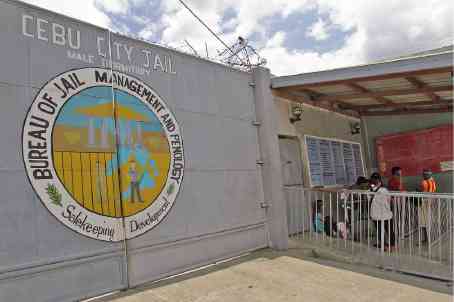
Cebu City officials are alarmed over the high number of HIV cases in the city jail. —JUNJIE MENDOZA / CEBU DAILY NEWS
CEBU CITY—Officials in this Cebu capital are alarmed over the high number of inmates who tested positive for human immunodeficiency virus (HIV), which causes the deadly Acquired Immune Deficiency Syndrome (AIDS).
Latest blood tests done on prisoners at the Bagong Buhay Rehabilitation Center (BBRC) here showed that 136 inmates were positive for HIV.
Of these, 88 had tested positive before their detention and were undergoing medication while 48 had been scheduled for a medical examination, said Cebu City Councilor Dave Tumulak.
He said three inmates who were recently found HIV positive refused to undergo treatment.
At least 23 cases of tuberculosis were also recorded in the congested facility.
According to Tumulak, Cebu’s BBRC in Barangay Kalunasan has an ideal capacity of 1,600 inmates, but is currently housing 4,198 inmates. Jail officials said they were hoping to ease congestion in the facility with the construction of a four-story building inside the compound next year.
Alarming
“It sounds alarming that we didn’t know there were HIV and TB patients in the city jail,” he said.
Tumulak said city officials suspected that 48 inmates had been infected after sharing contaminated needles to take the painkiller Nubain. The inmates may have buried the needles and burned the syringes since jail officials did not find anything during a recent prison inspection, he said.
Councilor James Cuenco also believed the virus was spread through the sharing of contaminated needles and syringes.
“Eighty-eight had already tested positive before they entered the facility … but what about the 48 others?” he asked. “It is possible they got the virus inside the facility.”
But Supt. Arnel Peralta, Cebu City jail warden, said all 136 inmates acquired the virus before they were detained.
Body fluids
“They did not get the diseases inside the jail,” he said in a telephone interview on Tuesday.
HIV is spread through body fluids from a person found to be HIV-positive, according to the website of Centers for Disease Control and Prevention. These body fluids, which include blood, semen and pre-seminal fluids, rectal and vaginal fluids and breast milk, can be transmitted through unprotected sex, sharing of needles or syringes, and from mother to child during pregnancy, childbirth or breastfeeding.
Peralta, however, said HIV patients inside the jail were not confined in one cell but were allowed to join other inmates.
“We could not separate them from the rest because that is a human rights violation. In fact, we did not tell the inmates who among them had HIV. Only the inmate with this kind of virus knows,” Peralta said.
The Department of Health has been supplying the facility with medicines for inmates with HIV. —WITH REPORTS FROM IZOBELLE PULGO AND ADOR VINCENT MAYOL